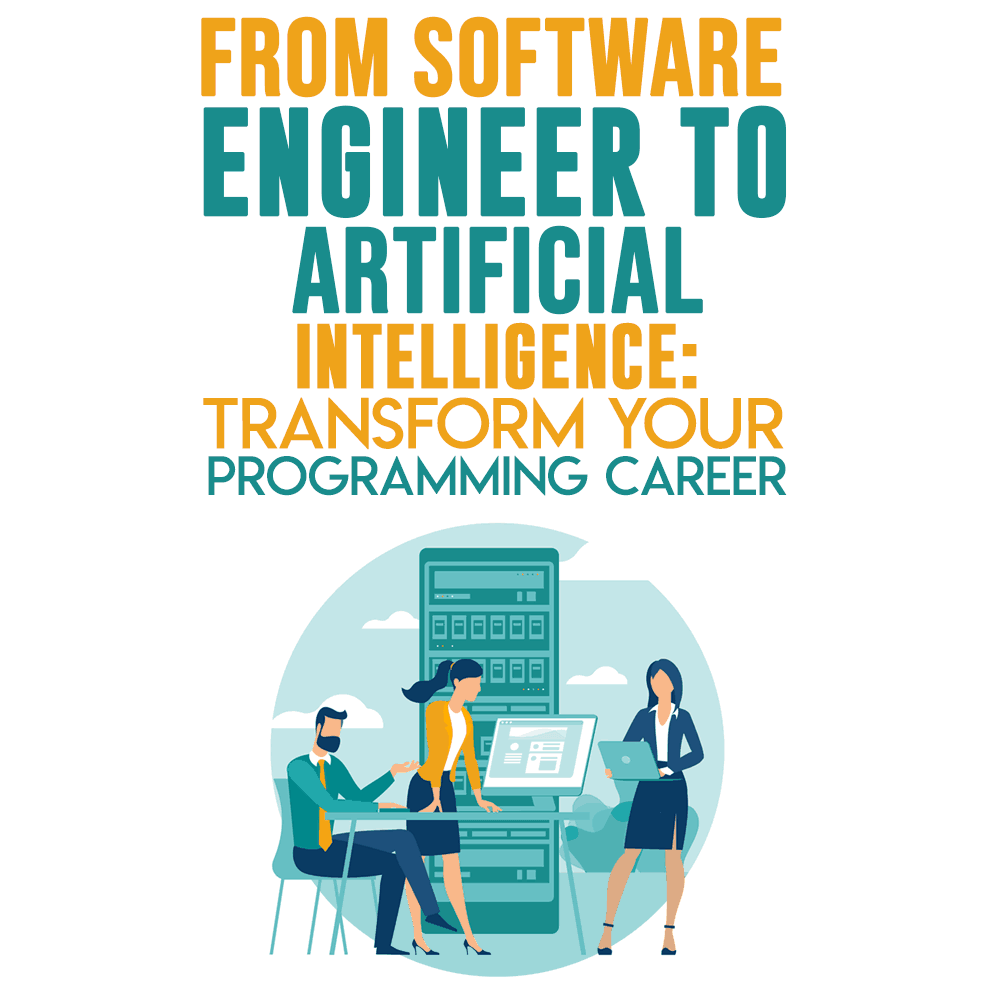All Categories
Featured
Table of Contents
- – No Code Ai And Machine Learning: Building Data...
- – How To Become A Machine Learning Engineer & Ge...
- – Our What Do I Need To Learn About Ai And Mach...
- – Not known Facts About 5 Best + Free Machine L...
- – Indicators on Online Machine Learning Engine...
- – Facts About Machine Learning Revealed
- – The Facts About Fundamentals Of Machine Lear...
Some individuals think that that's dishonesty. Well, that's my whole occupation. If somebody else did it, I'm mosting likely to utilize what that individual did. The lesson is placing that apart. I'm requiring myself to analyze the feasible options. It's more about eating the web content and attempting to apply those ideas and less about finding a library that does the work or searching for somebody else that coded it.
Dig a little bit deeper in the math at the beginning, just so I can build that foundation. Santiago: Ultimately, lesson number 7. I do not believe that you have to understand the nuts and screws of every formula prior to you utilize it.
I would certainly have to go and check back to really get a far better intuition. That does not indicate that I can not fix points using neural networks? It goes back to our sorting instance I assume that's simply bullshit advice.
As a designer, I've serviced many, several systems and I've made use of lots of, numerous points that I do not understand the nuts and screws of exactly how it functions, even though I recognize the impact that they have. That's the last lesson on that particular string. Alexey: The amusing point is when I consider all these collections like Scikit-Learn the formulas they make use of inside to carry out, as an example, logistic regression or another thing, are not the like the formulas we study in artificial intelligence classes.
No Code Ai And Machine Learning: Building Data Science ... Things To Know Before You Buy
Even if we tried to learn to get all these fundamentals of maker knowing, at the end, the formulas that these libraries make use of are various. Santiago: Yeah, absolutely. I believe we require a lot much more materialism in the market.

Incidentally, there are 2 various courses. I normally speak with those that wish to function in the industry that desire to have their effect there. There is a path for scientists and that is totally different. I do not dare to discuss that because I do not understand.
Right there outside, in the industry, materialism goes a long method for sure. Santiago: There you go, yeah. Alexey: It is a great motivational speech.
How To Become A Machine Learning Engineer & Get Hired ... - An Overview
Among things I desired to ask you. I am taking a note to speak about progressing at coding. Yet initially, allow's cover a pair of points. (32:50) Alexey: Let's start with core devices and frameworks that you need to find out to really transition. Let's say I am a software designer.
I know Java. I know SQL. I understand exactly how to utilize Git. I understand Celebration. Maybe I know Docker. All these things. And I become aware of equipment discovering, it appears like a great point. What are the core tools and frameworks? Yes, I enjoyed this video clip and I get convinced that I don't need to obtain deep right into math.
What are the core devices and structures that I require to learn to do this? (33:10) Santiago: Yeah, definitely. Terrific inquiry. I believe, top, you ought to begin finding out a little bit of Python. Considering that you already know Java, I don't believe it's going to be a substantial shift for you.
Not because Python coincides as Java, yet in a week, you're gon na obtain a lot of the distinctions there. You're gon na be able to make some development. That's top. (33:47) Santiago: After that you get certain core tools that are mosting likely to be made use of throughout your whole profession.
Our What Do I Need To Learn About Ai And Machine Learning As ... Diaries
You get SciKit Learn for the collection of maker knowing formulas. Those are devices that you're going to have to be using. I do not suggest just going and finding out regarding them out of the blue.
We can speak about details courses later on. Take one of those programs that are mosting likely to start presenting you to some problems and to some core ideas of artificial intelligence. Santiago: There is a program in Kaggle which is an introduction. I don't keep in mind the name, but if you go to Kaggle, they have tutorials there absolutely free.
What's great regarding it is that the only demand for you is to understand Python. They're mosting likely to offer an issue and inform you how to utilize decision trees to solve that certain trouble. I think that procedure is extremely effective, because you go from no machine finding out history, to understanding what the trouble is and why you can not solve it with what you understand now, which is straight software application engineering methods.
Not known Facts About 5 Best + Free Machine Learning Engineering Courses [Mit
On the various other hand, ML engineers specialize in building and deploying equipment knowing models. They concentrate on training models with data to make forecasts or automate jobs. While there is overlap, AI engineers take care of even more varied AI applications, while ML designers have a narrower concentrate on maker understanding formulas and their functional implementation.

Machine discovering designers concentrate on creating and releasing equipment understanding models right into manufacturing systems. On the other hand, data scientists have a broader function that consists of information collection, cleaning, exploration, and building versions.
As organizations significantly embrace AI and machine discovering innovations, the demand for competent specialists grows. Machine understanding designers work on sophisticated projects, contribute to innovation, and have affordable incomes.
ML is basically various from traditional software advancement as it concentrates on training computer systems to pick up from information, as opposed to programming explicit policies that are implemented methodically. Unpredictability of results: You are possibly used to writing code with predictable outputs, whether your feature runs when or a thousand times. In ML, however, the end results are much less specific.

Pre-training and fine-tuning: Exactly how these models are educated on vast datasets and afterwards fine-tuned for particular jobs. Applications of LLMs: Such as text generation, belief evaluation and info search and access. Papers like "Interest is All You Need" by Vaswani et al., which presented transformers. Online tutorials and programs concentrating on NLP and transformers, such as the Hugging Face training course on transformers.
Indicators on Online Machine Learning Engineering & Ai Bootcamp You Should Know
The capability to manage codebases, merge adjustments, and solve disputes is equally as important in ML growth as it remains in typical software projects. The skills established in debugging and testing software application applications are extremely transferable. While the context could alter from debugging application reasoning to recognizing issues in data handling or model training the underlying concepts of methodical examination, hypothesis testing, and repetitive improvement coincide.
Equipment learning, at its core, is heavily dependent on statistics and likelihood theory. These are important for comprehending how algorithms discover from data, make predictions, and evaluate their performance.
For those thinking about LLMs, a thorough understanding of deep understanding architectures is helpful. This consists of not only the mechanics of semantic networks but additionally the style of particular models for various use cases, like CNNs (Convolutional Neural Networks) for image processing and RNNs (Recurrent Neural Networks) and transformers for consecutive information and natural language handling.
You ought to understand these issues and discover strategies for determining, reducing, and connecting concerning bias in ML versions. This includes the prospective impact of automated choices and the moral implications. Several designs, particularly LLMs, need substantial computational resources that are often offered by cloud platforms like AWS, Google Cloud, and Azure.
Structure these abilities will not just promote a successful shift into ML but likewise guarantee that designers can contribute properly and responsibly to the development of this dynamic area. Theory is vital, but nothing defeats hands-on experience. Begin working with projects that allow you to use what you have actually discovered in a functional context.
Build your jobs: Start with simple applications, such as a chatbot or a message summarization device, and slowly increase complexity. The field of ML and LLMs is rapidly developing, with brand-new innovations and technologies arising routinely.
Facts About Machine Learning Revealed
Contribute to open-source tasks or create blog site messages regarding your understanding journey and projects. As you get expertise, begin looking for possibilities to include ML and LLMs right into your job, or seek new duties concentrated on these modern technologies.

Potential use cases in interactive software, such as suggestion systems and automated decision-making. Recognizing unpredictability, fundamental analytical procedures, and possibility circulations. Vectors, matrices, and their role in ML formulas. Mistake minimization methods and gradient descent described merely. Terms like model, dataset, features, labels, training, reasoning, and validation. Information collection, preprocessing methods, design training, examination procedures, and implementation considerations.
Decision Trees and Random Woodlands: Intuitive and interpretable designs. Matching problem kinds with ideal versions. Feedforward Networks, Convolutional Neural Networks (CNNs), Recurrent Neural Networks (RNNs).
Information circulation, makeover, and feature engineering strategies. Scalability principles and efficiency optimization. API-driven approaches and microservices integration. Latency monitoring, scalability, and version control. Continual Integration/Continuous Release (CI/CD) for ML operations. Model surveillance, versioning, and efficiency monitoring. Finding and attending to changes in design performance in time. Attending to efficiency traffic jams and source monitoring.
The Facts About Fundamentals Of Machine Learning For Software Engineers Uncovered

Training course OverviewMachine knowing is the future for the future generation of software application specialists. This course functions as a guide to artificial intelligence for software program designers. You'll be introduced to 3 of the most appropriate parts of the AI/ML self-control; monitored knowing, neural networks, and deep learning. You'll realize the distinctions in between standard shows and artificial intelligence by hands-on development in supervised understanding prior to constructing out complex dispersed applications with neural networks.
This training course functions as a guide to device lear ... Program A lot more.
Table of Contents
- – No Code Ai And Machine Learning: Building Data...
- – How To Become A Machine Learning Engineer & Ge...
- – Our What Do I Need To Learn About Ai And Mach...
- – Not known Facts About 5 Best + Free Machine L...
- – Indicators on Online Machine Learning Engine...
- – Facts About Machine Learning Revealed
- – The Facts About Fundamentals Of Machine Lear...
Latest Posts
How To Answer “Tell Me About Yourself” In A Software Engineering Interview
The Ultimate Software Engineering Phone Interview Guide – Key Topics
The 10 Most Common Front-end Development Interview Questions
More
Latest Posts
How To Answer “Tell Me About Yourself” In A Software Engineering Interview
The Ultimate Software Engineering Phone Interview Guide – Key Topics
The 10 Most Common Front-end Development Interview Questions